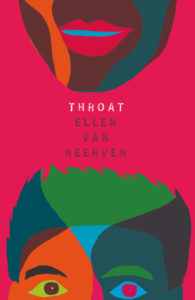Daniel Sleiman reviews Throat by Ellen Van Neerven
 Throat
Throat
By Ellen Van Neerven
Reviewed by DANIEL SLEIMAN
In reading poetry, we look for those rare moments where a creative sequence of words thoroughly subjects our thinking, our feeling and our knowledge to a momentary realisation of reinterpreted or interrupted truth. There are many of those moments one finds while reading Ellen Van Neerven’s poetry collection Throat (2020). Take these three lines appearing in different poems.
Take me to the back of your throat, I’ll stay
(p123)
Language is empty without ceremony
(p128)
Climate is our only bank
(p33)
Neerven can say so much with so little. In fact, that’s poetry’s appeal and the/ir craft in writing reflects the tightness and complexity of its form. They display a matured economy of expression but are as comfortable writing longer narrative-driven verse.
One of my favourite pieces in Throat is only ten words long and finds its place in the section called ‘Whiteness is always approaching’. It is a title, which based on the section’s themes, could have easily worked as ‘Whiteness is always encroaching’.
I was a perfect GF but sometimes I was black.
(p42-43)
These words are presented on two full pages, the otherwise emptiness or silence gives them so much more meaning. One is tempted to even continue the writing with their own insecure reflected prepositions in the empty space. There is so much more to be said, and those thoughts are instinctively taking place in the reader’s cognitive play.
The conscious stylistic choices are also replete throughout the collection. The use of the Aboriginal flag along with text in ‘Logonliveon’ serves as a punctuating reminder, self-identification and reconstructed meaning to fit the changing moment of technology and living. A treaty is drafted and presented to the reader questioning the/ir relationship with the production of the book but also of white Australia—a status quo, often neglectful of Aboriginal voices on the question of sovereignty. Australia of course remains the only Commonwealth country without a treaty with its Indigenous population.
‘Treaty’ presents the reader with so many questions to unpack. And Neerven does that poignantly. Hard truths demand hard questions. Neerven takes up the role not only of a poet but as an educator. The book comes with a reading list for ‘Whiteness is always approaching’. It includes writers like Ghassan Hage, Toni Morrison and Vivek Shraya. The white reader is undoubtedly urged to spend some time in this section.
‘Expert‘ and ‘White Excellence‘ are two poems that really hit the nail when it comes to white presumptions, white language and the critique of Black Excellence centred around the white gaze.
Think I got
a non-Indigenous girlfriend
who thinks she’s an expert
don’t know how she got her expertise
(45)
There have been too many white ‘experts’ on what matters to Black people. This was especially noted during the #BLM movement where Australian TV panels got a lot of flak for not inviting any Black speakers on issues that directly affected them.
‘White Excellence’ comes in many forms but my favourites are the ones who cook for me. Listen, make space. Buy black books, buy black music. Never assume to know what we think or what we want.
(56)
T.S Eliot once wrote that poetry is ‘the common pursuit of true judgment’. There is a measured concern in Neerven’s writing, whether it’s the devaluing of Indigenous languages, connection to land and water or gendering. It is a judgment both in critique and insight, but one that opens conversation rather than shutting it down. Whilst subtlety has always been the measure of art, there is nothing wrong with calling a spade a spade, and Neerven even titles one of their poems ‘Call a spade a spade’ where they take issue with the mealy mouthed semantics in our everyday political discourse. Don’t say ‘no worries’ say ‘I worry’.
In ‘Four Truths and a Treaty’ they write:
We gotta talk about sexism, homophobia, and transphobia in the community. No point pretendin it don’t exist.
(58)
Blunt.
As a queer Black writer, Neerven explores the sometimes-knotty intersection of sex and race politics. It is a lived experience, and it comes through in their words both genuinely, and in exploratory ways giving no defining answers but retaining our attention nonetheless vividly and honestly. In the section titled ‘I can’t wait to meet my future genders’ their poem ‘Body Flow’ imparts a resounding expectation or even resignation in describing their body.
I guess it would be fitting to describe my body here.
Spidery
Flowy
nothing to hide
hips in the wrong place
unambitious arms
(67)
Neerven’s writing however is anything but unambitious, with Throat being her third published work following on from Heat and Light and Comfort Food. It is a work that tackles familiar themes, but one that is done with a uniquely sustained style and an undeniably fresh voice; a voice that one can return to on the page and in recitation and find added nuance and meaning and a reason to care. One cannot help but to find a certain affinity with the poems, and the writer, as one reads and rereads Throat. It feels like a crush.
In ‘Crushed‘ Ellen writes:
All my crushes
have been books
(98)
What a wonderful way to think about our relationship with books. With a red, sinuously coloured cover featuring lips, eyes, and with an evocative title in Throat many readers will feel attuned to Neerven’s latest work.
Notes
- T.S Eliot, ‘The function of criticism’ first appeared in the journal he founded, The Criterion, Vol 2, No 5, Oct.1923